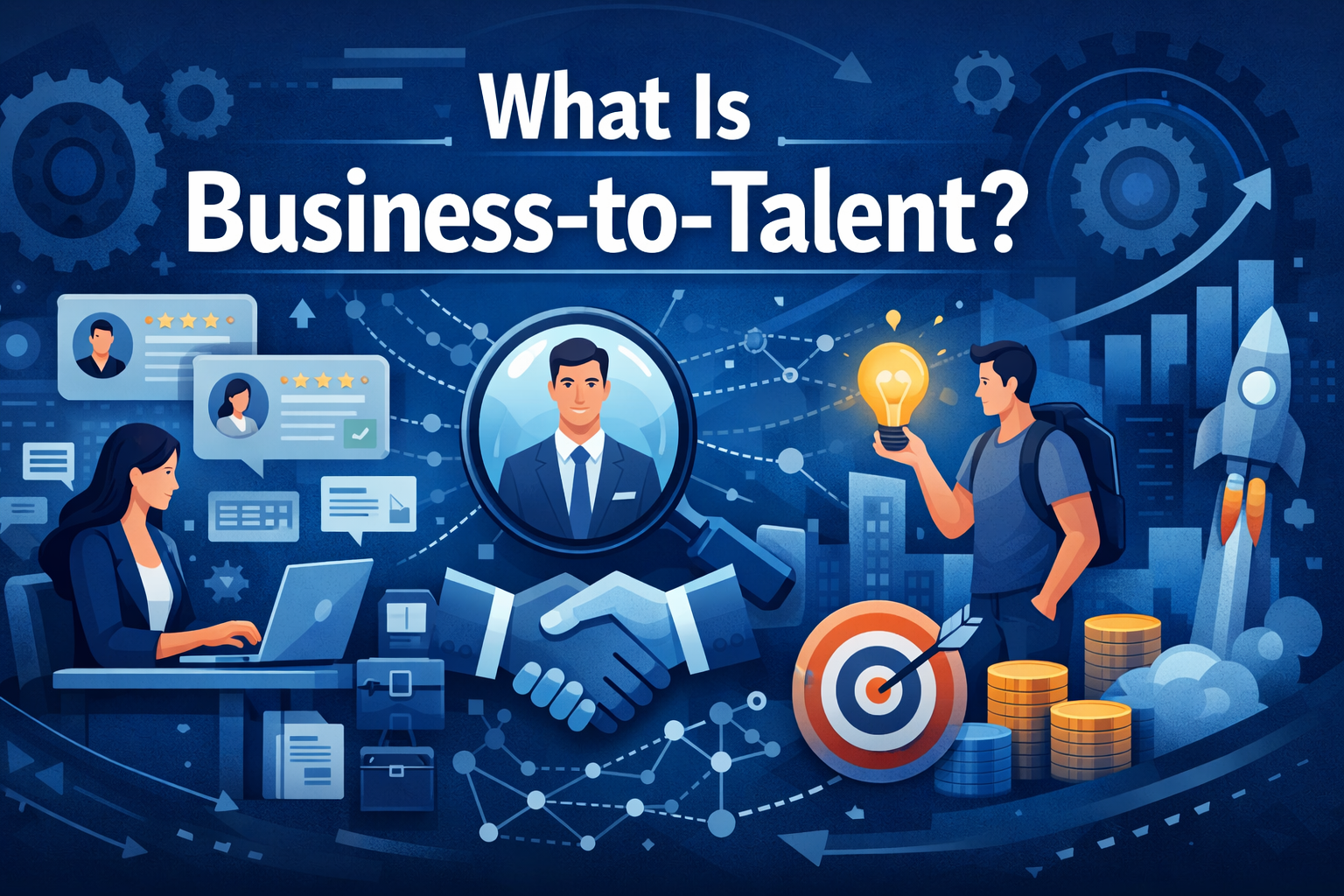
B2B partnerships 2025 is playing an important role in shaping the recruitment strategies. Hiring Landscape is undergoing an seismic innings. What was a linear process of posting jobs, screening and renting it once, turned into a multidimensional challenge requiring innovation, efficiency and cooperation.
Companies today are facing mounting pressure to find skilled talent amidst growing competition, skyrocketing costs, and shifting workforce demands. Recent industry data highlights that 75% of employers struggle to find talent with the right skills, while the average cost per hire has risen to $4,700, making traditional hiring methods increasingly unsustainable.
Against this backdrop, B2B partnerships 2025 have emerged as a transformative solution. These collaborations are reshaping recruitment, enabling businesses to streamline processes, optimize costs, and access broader talent pools. By working together, companies are not only addressing the inefficiencies of traditional hiring practices but also future-proofing their talent acquisition strategies.
As 2025 approaches, the influence of B2B partnerships on hiring is becoming increasingly evident. These collaborations offer a more agile and inclusive approach, providing businesses with the tools they need to adapt to a rapidly changing job market.
Recruitment today is fraught with challenges that traditional methods are ill-equipped to address. The global demand for specialized skills has surged, with roles in artificial intelligence and data science experiencing a 40% annual growth in demand. However, the educational system has been unable to keep pace, resulting in a significant skills gap.
Moreover, the hiring process has become increasingly time-consuming, with the average recruitment cycle now stretching to 27 days for many positions. These delays can cost organizations not only financially but also competitively, as high-quality candidates often accept offers from faster-moving competitors.
Hiring costs are another pressing concern, particularly for smaller organizations. From job advertisements to onboarding expenses, recruitment can quickly become a financial burden. For many businesses, operating in silos and relying solely on in-house efforts to fill roles is simply no longer sustainable.
Adding to these challenges is the growing emphasis on diversity and inclusion. While companies are increasingly aware of the benefits of a diverse workforce, achieving these goals remains difficult. Traditional hiring channels often lack the reach needed to connect with underrepresented talent pools, limiting companies’ ability to create truly inclusive teams.
How B2B Partnerships 2025 Are Changing the Game
B2B partnerships in recruitment involve businesses teaming up to share resources, technologies, and knowledge, creating a more robust and efficient hiring ecosystem. These partnerships go beyond outsourcing recruitment processes to agencies they involve pooling candidate databases, hosting joint recruitment drives, or co-developing training programs. Through collaboration, businesses can reduce recruitment costs by to 30% and increase the quality of hires by sharing access to talent pools and advanced technologies.

So, why are B2B partnerships such a big deal? Simple: they solve some of the biggest challenges in recruitment like skills gaps, high costs, slow processes, and lack of diversity. By working together, businesses can:
- Fill roles faster.
- Access better talent.
- Save money.
- Build a workforce that’s skilled, diverse, and future-ready.
Bridging the Skills Gap with Joint Training Programs
The widening skills gap is a challenge that no single company can solve alone. By co-developing training programs with educational institutions, industry partners, and online learning platforms, businesses can prepare candidates for emerging roles while sharing the associated costs.
By 2025, 54% of the global workforce is expected to require upskilling or reskilling. Companies participating in joint training initiatives can ensure a steady pipeline of job-ready talent while addressing their industry’s specific needs. For instance, healthcare organizations might partner to develop certification programs for telemedicine specialists, while tech firms could create boot camps for AI and machine learning professionals.
Streamlined Recruitment Processes
Recruitment processes are often bogged down by inefficiencies, from manual resume screening to time-intensive interview coordination. B2B partnerships can help alleviate these burdens by enabling shared systems and streamlined processes.
Collaborative hiring platforms, for example, allow businesses to leverage AI-driven applicant tracking systems (ATS). These tools can screen candidates with 70% greater accuracy, cutting recruitment timelines by as much as 40%. Additionally, joint hiring events both in-person and virtual—provide candidates with access to multiple opportunities while enabling businesses to identify top talent more quickly. Companies that embrace collaborative recruitment strategies by 2025 could see a 30% reduction in hiring costs, according to industry estimates.
Faster Recruitment Through Shared Technology
Recruitment costs are a significant pain point for organizations, especially smaller ones. Advertising, recruiting platforms, onboarding, and training—all add up quickly. Collaborating with other businesses allows organizations to share these expenses, creating a more cost-effective hiring model. Multiple companies within a sector could fund a joint recruitment fair, splitting costs while reaping the benefits of exposure to a large candidate pool. Technology plays a huge role in modern hiring, but advanced tools like AI-driven applicant tracking systems (ATS) or predictive analytics can be pricey. B2B partnerships 2025 allow businesses to share access to these technologies, making recruitment faster and smarter.
For example:
- AI tools can screen thousands of resumes in seconds, boosting recruitment efficiency by up to 90%.
- Predictive analytics can help businesses forecast hiring needs and identify the best candidates faster.
By working together, businesses can make the most of these tools without shouldering the entire cost alone.
B2B Partnerships 2025 Driving Broader Candidate Pools Across Industries
One of the most significant advantages of B2B partnerships is access to shared talent networks. By pooling candidate databases, businesses can tap into a broader range of potential hires. For example, a tech company and a financial services firm might share access to pre-screened software engineers or data analysts, allowing both to fill roles more quickly and effectively.
These partnerships are particularly beneficial for companies in second-tier cities and emerging markets. Recent trends indicate that hiring activity in cities like Jaipur and Bhubaneswar has grown by 14-24% year-over-year, highlighting the increasing importance of reaching talent beyond traditional metropolitan hubs.

Final Thoughts on B2B Partnerships 2025
The hiring landscape is changing, and businesses that adapt to these shifts will lead the way in 2025 and beyond. B2B partnerships offer a transformative approach to recruitment, addressing the challenges of rising costs, skills shortages, and diversity gaps. By working together, companies can create a hiring ecosystem that is efficient, inclusive, and sustainable.
From accessing broader talent pools to developing industry-specific training programs, these collaborations provide a pathway to smarter, faster, and more cost-effective hiring. The future of recruitment isn’t just about hiring better it’s about building a workforce that’s ready for the challenges and opportunities of tomorrow. By 2025, businesses that invest in B2B partnerships will not only stay competitive but also set new standards for innovation and excellence in talent acquisition.
Visit Us >>> https://blog.impacteers.com/
About us >>> https://www.impacteers.com/



Post Comment